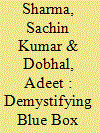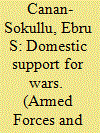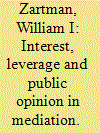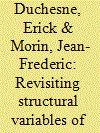|
|
|
Sort Order |
|
|
|
Items / Page
|
|
|
|
|
|
|
| Srl | Item |
| 1 |
ID:
180245


|
|
|
|
|
| Summary/Abstract |
Developing members at the WTO face a shrinkage in policy space for supporting their agricultural sector due to the limited room available under the provisions of the Agreement on Agriculture (AoA). Contrastingly, most developed members can provide high levels of product-specific support without breaching their commitments on account of their support entitlements. For some of these members, the so-called ‘Blue Box’ under the AoA, plays a pivotal role in expanding the policy space with respect to domestic support to agricultural products. Though a lot of scholarship has discussed and examined other support provisions under the AoA, the ‘Blue Box’ remains relatively shrouded in mystery. Testimony to this is the fact that although the Blue Box has found use amongst developed members, no developing member, except for China in 2016, has ever used the Blue Box to support their producers. Given the impasse in the Doha Round of negotiations and limited flexibilities available under the AoA, this paper examines the feasibility and compatibility Blue Box measures with developing members’ socio-economic situation. Findings of this paper bring to fore the variations in member practice and the operational flexibilities available in implementing Blue Box programmes to support agriculture.
|
|
|
|
|
|
|
|
|
|
|
|
|
|
|
|
| 2 |
ID:
109948


|
|
|
|
|
| Publication |
2012.
|
| Summary/Abstract |
This study examines the differences recorded in transatlantic relations from the viewpoint of mass public opinion in the United States of America, Germany, France, and the United Kingdom concerning military engagements in the post-Cold War era, namely the Kosovo (1999), Afghanistan (2001), and Iraqi (2003) wars. Theoretically, this study builds upon the analysis of the "domestic support for wars" from three mainstream theories of public opinion concerning the use of force; namely, the "principal policy objectives," "ends and means calculus," and the "leadership effect." It also offers a multidimensional approach by introducing a number of variables such as risk, halo effect, multilateral participation, legitimacy, escalation, and self-defence concerning wars. Taking a comprehensive view of the existing polling data on public opinion (1998-2004) an aggregate analytical method is devised and a quantitative analysis of the aggregate polling data is employed to map out correlations between trends in warfare and trends in domestic support for wars.
|
|
|
|
|
|
|
|
|
|
|
|
|
|
|
|
| 3 |
ID:
087300


|
|
|
|
|
| Publication |
2009.
|
| Summary/Abstract |
Saadia Touval's important contributions to the study of mediation included an emphasis on the interests and motivations of mediators, hitherto often assumed to be pure or non-existent. As a result, legitimacy is usually considered to be inherent in the selfless mediator, although in internal affairs, mediation is illegitimate meddling. At the same time, much of the work on mediation either exaggerates or underestimates the nature of leverage. Public opinion also has an important but ambiguous relation to mediation. Interests, public opinion and leverage were topics where Touval helped to establish a more realistic appreciation, as illustrated in this second commemorative issue of International Negotiation.
|
|
|
|
|
|
|
|
|
|
|
|
|
|
|
|
| 4 |
ID:
120715


|
|
|
|
|
| Publication |
2013.
|
| Summary/Abstract |
Abstract This article offers a conceptual analysis of the negotiation of the Comprehensive Economic and Trade Agreement (CETA) between Canada and the European Union. It argues that traditional accounts of the structure of trade negotiations must be tailored for their novel nature, especially their wider scope on various regulatory issues and the relative economic weight of trading partners. To build our argument, we revisit traditional structural factors such as economic interdependence, non-agreement alternatives (NAA), institutional constraints, outcome valuations, and domestic support. We conclude that current and future bilateral trade negotiations will likely last longer, deadlocks will likely become more frequent, and that variations in scope will likely increase.
|
|
|
|
|
|
|
|
|
|
|
|
|
|
|
|
|
|
|
|
|